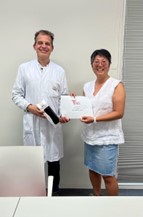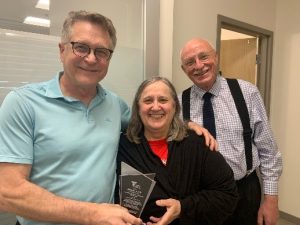Blog
It’s been a year of surprises for our Vasculitis Recognizing Excellence in Diagnosis (V-RED) award program. We have two winners who tied for first place, two winners who received honorable mentions, and this is the first year we’ve had a winner from Germany and Saskatoon, Canada.
This is the 10th year that the VF has called upon patients from around the globe to nominate a medical professional they want to recognize for making a critical, early diagnosis of vasculitis. And in 2023, we continue to honor them for their efforts to care for our patients.
Karen Hirsch created the award program after her son, Michael, was diagnosed with granulomatosis with polyangiitis (GPA) in 2011 by Juanita Mora, MD, an allergist/immunologist at the Chicago Allergy Center. Dr. Mora’s quick diagnosis helped Michael receive timely treatment, which helped lead to his remission.
The 2023 V-RED Winners
Tied for First Place Winner: Prof. Dr. med. Bernd Turowski
Department of Diagnostic and Interventional Radiology
Düsseldorf University Hospital
 In September 2021, Autumn Lang had suffered nine strokes and an intracranial high-grade stenosis (a narrowing of an artery in the brain). Four days after the strokes, Autumn’s neurosurgical team at Düsseldorf University Hospital was considering doing cerebral artery bypass surgery or reopening the artery with a stent. On day five, however, her physician, Prof. Dr. Bernd Turowski and a team of neurologists, neurosurgeons and neuroradiologists began reviewing Autumn’s case further.
In September 2021, Autumn Lang had suffered nine strokes and an intracranial high-grade stenosis (a narrowing of an artery in the brain). Four days after the strokes, Autumn’s neurosurgical team at Düsseldorf University Hospital was considering doing cerebral artery bypass surgery or reopening the artery with a stent. On day five, however, her physician, Prof. Dr. Bernd Turowski and a team of neurologists, neurosurgeons and neuroradiologists began reviewing Autumn’s case further.
After performing a cerebral angiogram – looking for problems with blood vessels and blood flow in the brain – the team discussed the possibility of vasculitis. Autumn had heard the doctors say that if this was vasculitis, it would mean that a bypass or stent would be “contraindicated.”
Prof. Dr. Turowski and his team continued performing specific imaging, which included a cranial MRI, a CAT scan with cranial perfusion, carotid angiography, extracranial doppler duplix sonography, and transcranial duplix sonography. The testing provided the necessary information for everyone to agree that this was most likely central nervous system vasculitis. This all happened within 10 days of Autumn having her last stroke as she entered hospital care. “I’m here today with no mental or physical disabilities,” she explained. “Early diagnosis begins with physicians who are educated on vasculitis, and I thank Prof. Dr. Turowski and his team for continuing their education in rare conditions,” she said.
Tied for First Place Winner: Lindo Terry Spencer Jr., MD
Pediatric Pulmonologist
Providence, Rhode Island
Eighteen-year-old Lexey LaBonte caught COVID-19 in December 2020. As the new year began, she developed a persistent cough that continued to progress, which led to sinus pain and ear infections. Lexey’s former pediatrician referred her to an ear, nose and throat (ENT) specialist, who prescribed a nasal spray that is used to prevent and treat allergy symptoms (stuffy/runny nose, itchy eyes/nose/throat and sneezing). The ENT also mentioned the possibility of inserting ear tubes.
Since Lexey’s cough worsened, she was then referred by her former pediatrician to pulmonologist Dr. Lindo Terry Spencer Jr., whom she met in February 2021. An aggressive treatment plan began with prednisone and multiple inhalers. While the prednisone helped, the symptoms would return as soon as Lexey stopped taking it. In addition to the cough, Lexey also developed body aches, bloody noses, rashes, sudden weight loss, and ear issues. Ear tubes were placed in April, but Lexey’s hearing loss continued to deteriorate and as time went on her cough and breathing worsened. Her pulmonologist ordered various tests and imaging, including allergy blood testing, x-rays, CT scans, and a sputum induction.
The results from the imaging were consistent with aspergillosis/other fungal infections, yet the blood tests were negative. This led Lexey’s pulmonologist to dig deeper as her symptoms were “keeping [him] up at night.” He ordered blood tests that revealed results consistent with GPA, and Lexey was referred to a rheumatologist. She needed a lung biopsy before the diagnosis could be made, which took place in June. After that, Lexey was officially diagnosed with GPA, and she received rituximab infusions in August. Although the infusions helped her symptoms, she still needed hearing aids. Lexey continues to receive the infusions and had another round this past December.
“I am incredibly grateful for the efforts that Dr. Spencer made to uncover my diagnosis,” Lexey said. “From the first appointment he was committed to making me feel better again. My journey, along with the help of my medical team, has inspired me to pursue a career in medicine in the future.” Lexey lives in Portsmouth, Rhode Island.
Tied for Honorable Mention: Joseph C. Guzzo, MD
Nephrologist
Allentown, Pennsylvania
In the fall of 2020, Thomas Hyclak was very sick for two months with symptoms including extreme fatigue, muscle weakness and joint pain, lengthy bouts of severe coughing, fever and night sweats. While these symptoms were pretty severe, Thomas felt they matched what he had read online for someone recovering from pneumonia, which he had been treated for in August.
After a few weeks, Thomas’s wife, Jean, felt he wasn’t improving and took him to the ER at Lehigh Valley Health Network Muhlenberg Hospital on September 25, but he was discharged the next day. While at the hospital, he met with doctors from rheumatology and pulmonology. A CT scan revealed pulmonary fibrosis (a condition in which the lungs become scarred over time). He also had elevated rheumatoid factor. Rheumatoid factors are proteins produced by your immune system that can attack healthy tissue in your body. Thomas was prescribed 20 mg of prednisone to address his symptoms while he was following up with the specialists.
Because of the blood in his urine, which indicated kidney damage, Thomas was then referred to Dr. Joseph Guzzo. The doctor immediately ordered a kidney biopsy and sent the results to a colleague at Columbia University. The consensus was that Thomas had vasculitis, and Dr. Guzzo expedited treatment with Rituxan® in addition to the prednisone. “My kidneys have healed completely and while I have significant fibrosis, I am able to function well,” Thomas said. “The diagnosis of microscopic polyangiitis was tricky, and I credit Dr. Guzzo for his willingness to get on the phone and call people to get me tested and treated quickly. It made all the difference in where I am now with vasculitis in remission.” Seventy-six-year-old Thomas and his wife live in Bethlehem, Pennsylvania. They have a daughter and a son.
Tied for Honorable Mention: Mick Jutras, MD
Family Medicine
Saskatoon, Canada
 It was a beautiful day in June 1996 when Sharon Bourassa was walking down the hallway at work. She was greeted by one of the physicians, Dr. Mick Jutras, who was working in the physical therapy clinic that day. He stopped her and said, “Do you know you have a stridor? Are you ok?” Stridor is a high-pitched sound someone makes when air can’t flow through the lungs smoothly because it’s hard to breathe.
It was a beautiful day in June 1996 when Sharon Bourassa was walking down the hallway at work. She was greeted by one of the physicians, Dr. Mick Jutras, who was working in the physical therapy clinic that day. He stopped her and said, “Do you know you have a stridor? Are you ok?” Stridor is a high-pitched sound someone makes when air can’t flow through the lungs smoothly because it’s hard to breathe.
Sharon had been unwell since Oct 30, 1995, and like many people with GPA, she had been a told different things about the bleeding from her ears/nose, fatigue (and now stridor) for about eight months. Dr. Jutras told Sharon that she should not ignore this (she wasn’t).
“I asked him if he would see me, and I am forever grateful for that chance meeting in the hallway and an appointment the next day,” Sharon said. Dr. Jutras referred her to a rheumatologist, and at age 40, she was given a confirmed GPA diagnosis through bloodwork and a biopsy. At the time, it took six weeks to get the results from the bloodwork because it was sent out of the province. When diagnosed from the biopsy in August, she was told she would probably have three or four months to live if the treatment plan didn’t work.
Sharon’s husband searched for medical information in the library. While Sharon was in the hospital, she got a name and number for Marilyn Sampson. She called Marilyn as soon as she was released, and Marilyn sent her a package of information and pamphlets to share with doctors’ offices and hospitals. Sharon attended VF conferences to learn more and was impressed by Dr. Nancy Allen, whom she consulted with and developed a strategy after further bloodwork and urinalysis.
“Dr. Jutras has continued to quarterback my care since that ‘chance’ meeting. He has supported my decision to get a second opinion on the treatment plan (in the early years I was treated with cyclophosphamide for 18 months) and continues to challenge me today.” Sharon lives in Saskatoon, Saskatchewan, Canada and turns 67 this year.
